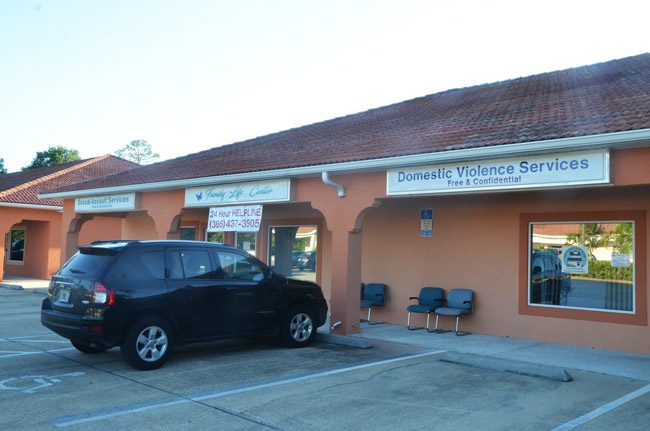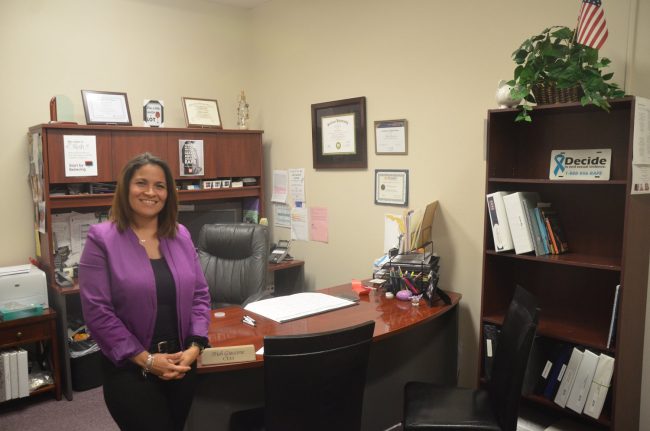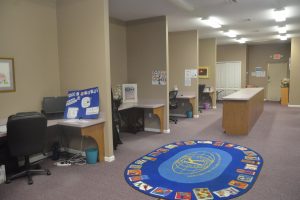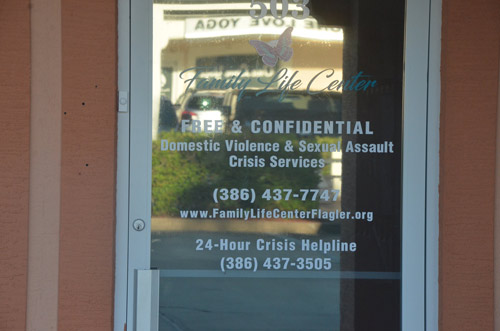
You can call it irony, poetic justice or simply a change of tenants: what used to be the Flagler County Sheriff’s investigative services’ offices and interrogation rooms is now the new administrative space for the Family Life Center, Flagler’s shelter for victims of domestic and sexual abuse.
The center last week hosted an open house and grand opening for the 4,000-square-foot facility that stretches across the equivalent of four storefronts at 4721 East Moody Boulevard, in the commercial strip at the southwest corner of State Road 100 and Belle Terre Parkway. Until then, says Executive Director Trish Giaccone, the center made do with a double-wide trailer behind the old school board offices just west of Flagler Palm Coast High School.
The move into the new building, Giaccone says, “means the community cares, because here’s the thing, it’s people walking into a building that’s warm and welcoming and we’re not hiding behind anything. We’re clearly in the open, domestic violence and rape are happening in our community, and we are strong and standing with our fellow survivors and saying, we’re here to help you. So I think moving here is really just a, Here we are and we’re here if you need us. I’ve always felt like the trailer was kind of hiding, really couldn’t find it and people don’t know what’s going on. No, it’s happening in our community. People need to know it’s happening.”

“Now that we have a dedicated detective, a dedicated crime analyst, we are looking at every case based on some of our investigation indicators,” said Sheriff Rick Staly, who was at the Family Life Center’s dedication last week. He gave the example of a particular offender, “a person that had a history of being arrested for domestic violence, getting arrested and released, he would immediately go back and violate the protective order. So we anticipated that’s what he would do this time, and through our InVest program, which is new for domestic violence, sure enough, that’s what he did, he got out of jail, and three days later he was back in jail for violating his protection order. That’s just proof that we’re taking this seriously, and the offenders should to. They should realize that, and we’re not going to tolerate them violating these protective orders.” (InVest is the sheriff’s coordinated team approach to combating domestic violence, an outgrowth of his domestic violence task force’s recommendations.)
Surveying the Family Life Center’s new office spaces—and noticing that while the furniture, paint and carpeting has changed, the layout and cubicles remain from the days when it was the detectives’ bureau—Staly said the place “gives a victim more confidence in the services and the support that are being offered.” He noted: “I can tell you, it looks a lot better than when the Sheriff’s Office had it.”
It’s not cheap: the Family Life Center is paying $3,000 a month. $3,000 a month. “Actually in Flagler County it is not at all” steep, Tammy Sanner, the center’s finance director, says. “It is probably about a half to two-thirds of what we would pay at any other location.”

The Family Life Center is a lot more than a shelter. The shelter itself is nowhere near the administrative offices: it’s elsewhere in Bunnell at a location that remains undisclosed for the protection of the residents. The administrative offices accommodate GIaccone, Sanner and an administrative assistant as full-timers, plus a small universe of satellite services that fulfill the center’s mission.
There are two outreach advocates, an outreach coordinator, a sexual assault coordinator, an economic justice advocate, a community relations advocate, and further office space for court and child welfare advocates, all of whom are in and out of the office. The center also partners with The House Next Door, a non-profit that provides mental health counseling in Volusia and Flagler, which uses office space in exchange for offering services at a lower rate. There’s also the Injunction for Protection Project: an attorney is responsible for representing victims of assault who file an injunction. Finally, there are nine shelter advocates and a coordinator, the grunts who keep the shelter going and under supervision 24 hours a day.
The Family Life Center has a $1.2 million budget, receiving $40,000 from the county commission each year for the past 11 years. The center also gets $15,500 in county funds for its rape-crisis program, which it took over a few years ago after the previous provider, the Children’s Advocacy Center in Daytona Beach, failed on the job. The county used to pay the advocacy center $50,000 for the same service. “So there’s quite a disparity there,” Giaccone said, though the Sheriff gets an additional $12,000 a year as a pass-through, for the center to fund Sexual Assault Nurse Examiners. “What we’d like to do is get the straight $50,000 from the county,” Giaccone said.
Since July the shelter has averaged 26 people per day, exceeding the equivalent of 7,500 bed nights, including children, who actually outnumber adults. There are two men currently at the shelter. “Men are victims as well,” Giaccone said. They have their own segregated room. Children will typically outnumber adults. This year there are fewer adults going through the shelter—despite the increase in domestic violence cases—but they’re staying longer. The average stay is eight weeks.
Security is always a concern, even at the administrative offices, which are now purposefully in the open. But “we don’t operate in fear,” Giaccone said. “We refuse as a team, we refuse to operate in fear and let perpetrators take our freedom away from us.”
![]()































Trish Giaccone says
FlaglerLive, Thanks for the exposure, however, I must admit in my opinion the terminology of “grunt” is completely inappropriate for the wonderful team of shelter advocates the Family Life Center employs. Our staff range in experience from three months to six years with the agency and range in education from High School diploma to master degree level education. I’m confident you didn’t mean it in a derogatory way but pure definition of the word can be construed as offensive. The Family Life Center Shelter staff is the backbone of our agency and all staff is valued, regardless of title. Again, thank you so much for coming to our ribbon cutting and we encourage you to visit our emergency shelter anytime. ~ Trish
FlaglerLive says
Trish, of course the word grunt was not meant in any derogatory way, as the context of the article demonstrates, but as reflecting the soldierly, difficult and often thankless task the advocates assume, with neither glamour nor luxury wages. The word is used the way Michael Herr used it so famously (at least to a previous generation) in “Dispatches,” when referring to soldiers: as everyday heroes no one will really see.